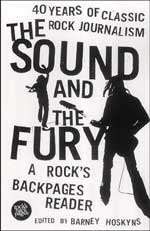Let Bygones Be Bygones | |

| It seems to me that
both Ian MacDonald's The People's Music [Pimlico, £10.00] and The
Sound and the Fury [Bloomsbury, £8.99], which is edited by Barney Hoskyns, work from the same kind of opinion about rock music. Namely, that there was some bygone glorious age when people did it much better than they ever have again. Even with my nostalgic inclinations I know that this is wrong: more than ever there is new and exciting music, of all types, being made; it's just that distribution networks and popular opinion have become more and more fragmented - no-one is now going to tell you what to listen to, or claim 'this is the future of rock'. And, of course, if they did, we'd
just laugh and go on listening to whatever we already were. Even accepting that these two books might be historical documents rooted in the more unified marketplace that 'rock' occupied they make for sad reading. That isn't to say there isn't good stuff in here, but Ian MacDonald is especially good at making stupid statements about things. For instance, he suggests that the Police were '...the last outstanding improvisatory rock group produced in Britain'! Excuse me? He also clings to the sixth-form notion that people must play their instruments properly & well, and cites punk as the big bogeyman that started a downwards slide in quality music. That and sequencers, which he clearly hates, failing to see that they are just an instrument, like anything else. Even in his better pieces - such as the final essay on Nick Drake - there's this underlying sense of longing for 'proper music' and days of yore. The People's Music, considered as a whole, seems disorganised, with short reviews inbetween longer more journalistic pieces and retrospective essays. The Sound and the Fury seems to have a little more structure, as each section [there are six] is then chronological, but its also hard here to see why Hoskyns has always chosen what he has. Section 1, ÔStardust', has an early piece on The Beatles, a superb Steve Turner piece on Bowie, and then dribbles away with the obvious and obligatory Springtseen and Nirvana pieces. I mean, a little invention would have been good here: what about those who tried to become stars and failed? what about the whole manufactured pop industry? what about those who become stars without, or despite, the music biz's bullshit? Section 2 is better. It's ÔClose Encounters' include Joni Mitchell, early 80s Neil Young, Dylan in his Jesus Freak stage, Madonna, Ice Cube and Morrisey. I'm glad to see the latter two there as token hiphop/indie artists, but can't say I like either of the artists involved. I guess, again, it's this abscence of the obscure, interesting, experimental or unknown musicians or bands that make this book so dull and earnest. I mean, even when the writing is good - and it often is here - I'm not sure we need to read about Abba, Marvin Gaye, Neil Young, Woodstock or The Band again. And I never want, or wanted, to read about our fascist guitarist friend Eric Clapton or Grand Funk Railroad! But let's be charitable. Good things include David Toop on The Beach Boys and their dubious Death Valley connections, Paul Williams in 1967 San Franciso, Michael Lydon at Monterey, and my two personal favourites: Caroline Coon on punk rock, and a 1981 piece on psychedelia by Robot A. Hull - despite the latter being, in my humble opinion, way off the mark about the subject. Of course, any lucky dip of rock journalism is never going to satisfy every reader, but there are anthologies on my shelves which have done better than this. There's a wealth of untapped stuff around from zines, newspapers and the web which deserves reissuing alongside other similar [or different!] writing; just as there are 1000s of bands that need mentioning and rescuing from oblivion. Personally, I'm looking forward to De Capo Best Music Writing 2003 and the forthcoming anthology of previously uncollected Lester Bangs' pieces that Serpent's Tail are issuing a whole lot more than rereading either of these books. © 2003 Rupert Loydell |